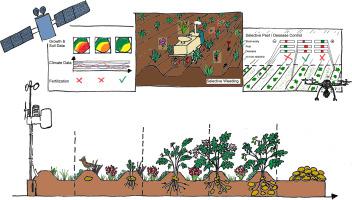Agricultural Systems ( IF 6.6 ) Pub Date : 2023-02-02 , DOI: 10.1016/j.agsy.2023.103607 David Gackstetter , Malte von Bloh , Veronika Hannus , Sebastian T. Meyer , Wolfgang Weisser , Claudia Luksch , Senthold Asseng

|
CONTEXT
Technological innovations in agriculture are mainly driven by the maxim: increase productivity at any costs. Today, in the face of climate change and an unprecedented loss of biodiversity, this approach is reaching its limits. Meeting global nutrition needs while achieving sustainability is one of the greatest challenges for modern agriculture.
OBJECTIVE
Autonomous field management represents the next evolutionary step in agricultural technology. It is characterized by an end-to-end automation of agricultural production processes and by that – for the first time in history - independence from labor constraints. Although literature has provided solutions for individual components of these new technological systems, integrating those components into a common, fully autonomous process has not yet been achieved.
METHODS
We analyzed the technological, agronomic, environmental, and related, interdisciplinary literature in the context of automated, and digital field crop management.
RESULTS AND CONCLUSION
The review shows the disruptive potential of fully autonomous, labor-independent crop management systems to guarantee the required food security by simultaneously allowing sustainable factors to be equally incorporated into the agricultural decision-making process. The integration of multifaceted objectives into a common decision-making process poses a great challenge to human farmers and their capacities. Liberated from labor constraints, autonomous systems have the potential to align decisions with the complex requirements of multiple − even contradicting – goals more easily, and to execute them accordingly without exhaustion. We show barriers that explain, why fully autonomous crop management is not yet present in today's agricultural practice, despite the fact that the majority of technological sub-components has reached a maturity stage beyond the proof of concept. Substantial technological progress will still be required with respect to the robustness in varying application settings and the standardization of interfaces to integrate diverse subsystems. For the adoption of autonomous cropping systems, societal engagement will be required including extensive research and discussion on public acceptance, legal frameworks, and the human farmers' future role as crucial success factors.
SIGNIFICANCE
Aligning autonomous cropping systems to domain-overarching objectives can make these technological solutions not only another, next stage of more efficiently producing technologies, but a game changer for new, environmentally sustainable cropping systems. Field management practice can leave the currently persisting, oversimplified management strategies, characterized by large-scale, and standardized field arrangements, toward more complex approaches with small-scale, diversely structured fields, which consider local particularities and the heterogeneity of the natural landscape.
中文翻译:

自主田间管理——农业可持续未来的推动者
语境
农业技术创新主要受格言驱动:不惜一切代价提高生产力。今天,面对气候变化和前所未有的生物多样性丧失,这种方法已达到极限。在实现可持续性的同时满足全球营养需求是现代农业面临的最大挑战之一。
客观的
自主田间管理代表了农业技术的下一步发展。它的特点是农业生产过程的端到端自动化,以及历史上第一次不受劳动力限制的影响。尽管文献已经为这些新技术系统的各个组件提供了解决方案,但尚未实现将这些组件集成到一个通用的、完全自主的过程中。
方法
我们在自动化和数字大田作物管理的背景下分析了技术、农艺、环境和相关的跨学科文献。
结果与结论
该审查显示了完全自主、独立于劳动力的作物管理系统的破坏性潜力,可以通过同时允许可持续因素平等地纳入农业决策过程来保证所需的粮食安全。将多方面目标整合到一个共同的决策过程中对人类农民及其能力提出了巨大挑战。从劳动力限制中解放出来,自治系统有可能更容易地使决策与多个 - 甚至相互矛盾 - 目标的复杂要求保持一致,并相应地执行它们而不会耗尽。我们展示了障碍,解释了为什么在当今的农业实践中还没有完全自主的作物管理,尽管大多数技术子组件已达到概念验证之外的成熟阶段。在不同应用程序设置的稳健性和集成不同子系统的接口标准化方面,仍然需要实质性的技术进步。为了采用自主种植系统,需要社会参与,包括对公众接受度、法律框架和人类农民未来作为关键成功因素的作用进行广泛研究和讨论。
意义
使自主种植系统与领域总体目标保持一致,可以使这些技术解决方案不仅是更高效生产技术的另一个、下一阶段,而且还可以改变新的、环境可持续的种植系统的游戏规则。田间管理实践可以离开目前持续存在的、过于简单化的管理策略,其特点是大规模和标准化的田间安排,转向更复杂的小规模、结构多样的方法,考虑当地的特殊性和自然景观的异质性。



























 京公网安备 11010802027423号
京公网安备 11010802027423号